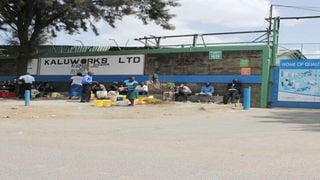
Kaluworks Limited along Kitui Road in Industrial Area, Nairobi.
| File | Nation Media GroupNews
Premium
Gone with the Wind: 2021 buried a record number of companies
Kenya had 11 companies placed under a receiver-manager between July and November 2021, the first time it crossed 10 companies since the Attorney General started publishing records online.
During this period 24 companies are set to be liquidated and their assets sold to pay creditors, suppliers, and employees their dues.
Kenya is going through an unprecedented period of failing companies after the Covid-19 crisis pushed several businesses into insolvency, sparking a scramble to recover debts by banks, suppliers, the taxman, and pension institutions.
The companies that have been placed in receivership include Kaluworks, Phoenix Publishers, Britania Foods, Mamba Village, Multiple Hauliers, General Printers, and Hoggers Ltd.
These have joined the long list of companies languishing between life and death, including Nakumatt Holdings, Midland Energy, ARM Cement and Deacons East Africa, Mumias Sugar, Karuturi, Chase Bank, and Imperial Bank.
The fall of these companies has left investors, creditors, and suppliers staring at billions of shillings in losses.
Fall of Hoggers
Mr Owen Koimburi, who was appointed administrator over South African fast-food franchise Hoggers, which ran the popular Steers and Debonairs Pizza, said it had total liabilities of Sh258.2 million against assets worth Sh119.3 million.
He also said the assets available to the unsecured creditors amounted to only Sh8.6 million against a total unsecured creditor balance of Sh226.7 million.
Justice Alfred Mabeya said evidence presented before him overwhelmingly showed that Hoggers could not meet its financial obligations.
“I find and hold that the evidence warrants the appointment of an interim liquidator pending the determination of the liquidation petition. He shall be responsible for the preservation of the assets of the company, which will be used for the repayment of the debts owed to all the creditors,” the judge said in October.
Among the creditors are DTB Bank (secured), Alkhaleej General Traders, The Hub in Karen -- which is owed Sh48.4 million as per court records, Property House Ltd, and the Oval Management, who were its landlords, seeking more than Sh22 million in rent.
The Tourism Fund also joined the case, saying the company was supposed to pay a two percent tourism levy as per the law and Hoggers owed the government Sh168 million as of March 2021.
Banks that restructured over Sh1.7 trillion since last year fear losing all their money and are placing failing businesses under their appointed administrators at the first sign of trouble, sparking a fight with other creditors over available assets.
Under the new Insolvency Act 2015, companies in financial distress have been using the legislation to ensure they remain a going concern as opposed to going into outright liquidation.
Creditors' fight
But once the company is liquidated, secured creditors are paid first, which means banks usually get paid ahead of smaller creditors.
A small creditor stopped I&M and NCBA from placing General Printers in receivership for a Sh2.7 billion loan, in a fight over the property of the distressed company.
Desbro Kenya, which is owed Sh36.4 million, wants to appeal a court decision that stopped it from auctioning assets of the company.
Desbro had obtained orders to sell nine vehicles belonging to General Printers before the banks realised the company was in trouble.
The two banks rushed to court to stop the auction and won a case arguing that the firm’s movable property is attached to their loans as secured creditors.
I&M appointed a receiver, but Desbro Kenya wants its appeal heard before the banks can sell off the property and pay themselves. Desbro argues that his case preceded the appointment of the manager.
“Desbro Kenya noted that the administrator appointed herein may proceed to dispose of the previously proclaimed goods in the exercise of his statutory powers so as to settle the secured creditors’ debts and it will be left without any other way to recover the decretal sum due to it from the defendant,” Judge Ngenye Macharia said.
The problem of failing companies may be much bigger than official data portrays it since most companies in Kenya are small informal businesses that do not make the headlines.
There are 7.4 million micro, small and medium enterprises (MSMEs) in the country. Majority of them (94 percent), are unlicensed micro-firms against only 138,000 formal companies, according to the World Bank.





